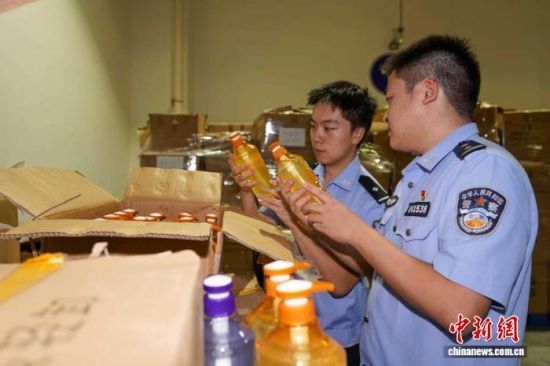Shanghai police have cracked down on two major counterfeit operations targeting the “Bee & Flower” brand, arresting 17 suspects and seizing over 3,000 fake products and 40,000 labels with a total value exceeding 10 million yuan.
Earlier this year, Shanghai Bee & Flower Daily Necessities Company reported through the police-business service platform that unauthorized stores on multiple e-commerce platforms were selling counterfeit “Bee & Flower” shampoo and conditioner products. The company confirmed these were trademark-infringing products that damaged brand reputation.
After receiving the report, police established a special task force. Investigation revealed over 30 stores used “authentic domestic product” labels with “Bee & Flower” product images to sell various hair care items, with “Ginger Hair Care” and “Pomegranate Nourishment” shampoos being the most frequently counterfeited. These fake products closely resembled genuine items in packaging and scent, making them difficult for consumers to identify. Some stores also mixed other daily chemical products to evade platform supervision. Each store’s counterfeit sales exceeded 50,000 yuan.
The criminal groups deliberately marked shipping labels as “Shanghai” to create a false impression of origin, exploiting the brand’s local reputation while actually shipping from another province.
Further investigation revealed a family-operated criminal structure where one suspect managed distribution, his wife handled orders, his mother managed finances, and a relative’s factory produced the counterfeit goods for online sales. Police also identified downstream distribution groups.

Arrest operation scene.
In March, police arrested 7 suspects and dismantled a complete counterfeit production line. In July, another 10-member gang was apprehended. This group purchased counterfeit products from another province, stored and labeled them in local warehouses, and sold them online. A shampoo retailing for about 30 yuan was sold at half price with a production cost of only 3-4 yuan, maintaining substantial profit margins.
To avoid platform detection and consumer complaints, suspects frequently used others’ identities to open new online stores, totaling over 20 shops.
All 17 suspects have been taken into criminal custody for selling counterfeit registered trademark goods. Three cases have been transferred to prosecutors for review, with investigations ongoing.



